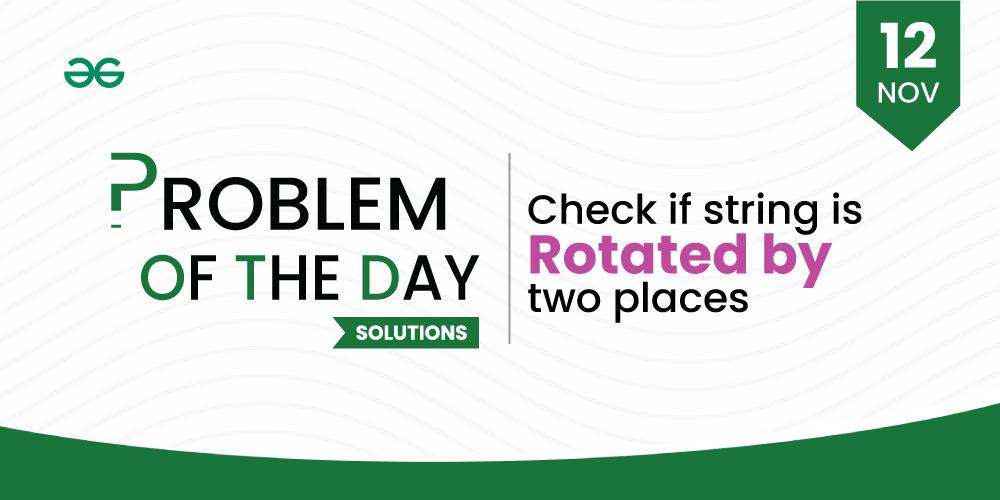POTD Solutions | 12 Nov’ 23 | Check if string is rotated by two places
Last Updated :
22 Nov, 2023
View all POTD Solutions
Welcome to the daily solutions of our PROBLEM OF THE DAY (POTD). We will discuss the entire problem step-by-step and work towards developing an optimized solution. This will not only help you brush up on your concepts of Strings but will also help you build up problem-solving skills.

POTD Solution 12 November 2023
We recommend you to try this problem on our GeeksforGeeks Practice portal first, and maintain your streak to earn Geeksbits and other exciting prizes, before moving towards the solution.
POTD 12 November: Check if string is rotated by two places:
Given two strings a and b. The task is to find if the string ‘b’ can be obtained by rotating (in any direction) string ‘a’ by exactly 2 places.
Examples:
Input: string1 = amazon, string2 = azonam
Output: Yes
Explanation: amazon can be rotated anti-clockwise by two places, which will make it as azonam.
Input: string1 = geeksforgeeks, string2 = geeksgeeksfor
Output: No
Explanation: If we rotate geeksforgeeks by two place in any direction, we won’t get geeksgeeksfor.
The idea is to Rotate the String1 in both clockwise and ant-clockwise directions once. And then check if this rotated string is equal to String2.
Step-by-step approach:
- If the length of both the strings are not equal or they are less than 2, return false.
- Store anti-clockwise rotation of string by concatenating substring of size two from end to the starting of the string.
- Store clockwise rotation of string by concatenating substring of size two from beginning to the end of the string.
- Checking if any of them is equal to string, return true.
Below is the implementation of the above approach:
C++
class Solution {
public:
bool isRotated(string str1, string str2)
{
if (str1.length() != str2.length())
return false;
if (str1.length() <= 2 || str2.length() <= 2)
return (str1 == str2);
string clock_rot = "";
string anticlock_rot = "";
int len = str2.length();
anticlock_rot = anticlock_rot
+ str2.substr(len - 2, 2)
+ str2.substr(0, len - 2);
clock_rot = clock_rot + str2.substr(2)
+ str2.substr(0, 2);
return (str1.compare(clock_rot) == 0
|| str1.compare(anticlock_rot) == 0);
}
};
|
Java
class Solution
{
public static boolean isRotated(String str1, String str2)
{
if(str1.length() <= 2 || str2.length() <= 2)
if(str1.equals(str2)) return true;
else return false;
if(str1.length() != str2.length()) return false;
int bt = 0;
char temp,temp1;
int flag = 0;
char c1[] = str1.toCharArray();
char c2[] = str2.toCharArray();
char ck[] = new char[c1.length];
char ak[] = new char[c1.length];
for(int a=0; a<c1.length-2; a++){
ck[a] = c1[a+2];
}
ck[c1.length-2] = c1[0];
ck[c1.length-1] = c1[1];
for(int a=2; a<c1.length; a++){
ak[a] = c1[a-2];
}
ak[0] = c1[c1.length-2];
ak[1] = c1[c1.length-1];
for(int a=0; a<c1.length; a++){
if(ck[a]!=c2[a]&&ak[a]!=c2[a]){
flag = 1;
break;
}
}
if(flag == 0){
bt = 1;
}
flag = 0;
if(bt == 1)
return true;
else
return false;
}
}
|
Python3
class Solution:
def isRotated(self,str1,str2):
n=len(str2)
if(n<3):
return str1==str2
anticlock_str=str2[2:]+str2[0:2]
clockwise_str=str2[-2]+str2[-1]+str2[:n-2]
if(str1==anticlock_str or str1==clockwise_str):
return True
return False
|
Time Complexity: O(N), Time is taken to rotate the string and then compare the string, where N is the length of the strings.
Auxiliary Space: O(N), Space for storing clockwise and anticlockwise strings.
The idea is to check directly if the string is rotated or not by comparing the two strings.
Step-by-step approach:
- Compare for clockwise and anticlockwise rotation by using for loops and the modulo operator:
- for clockwise direction,
- Run a loop from i = 0 to i < N
- if str1[i] != str2[(i + 2) % N], then update the variable clockwise as false and break the loop.
- For anti clockwise direction
- Run another loop from 0 to i < N
- if str1[i+2] % N != str2[i], then update the variable anticlockwise as false and break the loop.
- Return clockwise | anticlockwise (if any of them is true, it gives us as true result)
Below is the implementation of the above approach:
C++
class Solution {
public:
bool isRotated(string str1, string str2)
{
int n = str1.length();
bool clockwise = true, anticlockwise = true;
for (int i = 0; i < n; i++) {
if (str1[i] != str2[(i + 2) % n]) {
clockwise = false;
break;
}
}
for (int i = 0; i < n; i++) {
if (str1[(i + 2) % n] != str2[i]) {
anticlockwise
= false;
break;
}
}
return clockwise
or anticlockwise;
}
};
|
Java
public class Solution {
public boolean isRotated(String str1, String str2)
{
int n = str1.length();
boolean clockwise = true, anticlockwise = true;
for (int i = 0; i < n; i++) {
if (str1.charAt(i)
!= str2.charAt((i + 2) % n)) {
clockwise = false;
break;
}
}
for (int i = 0; i < n; i++) {
if (str1.charAt((i + 2) % n)
!= str2.charAt(i)) {
anticlockwise
= false;
break;
}
}
return clockwise || anticlockwise;
}
}
|
Python3
class Solution:
def isRotated(self, str1: str, str2: str) -> bool:
n = len(str1)
clockwise, anticlockwise = True, True
for i in range(n):
if str1[i] != str2[(i + 2) % n]:
clockwise = False
break
for i in range(n):
if str1[(i + 2) % n] != str2[i]:
anticlockwise = False
break
return clockwise or anticlockwise
|
Time Complexity: O(N), Iterating over the string 2 times for comparing both the strings, where N is the length of the strings.
Auxiliary Space: O(1)
Share your thoughts in the comments
Please Login to comment...